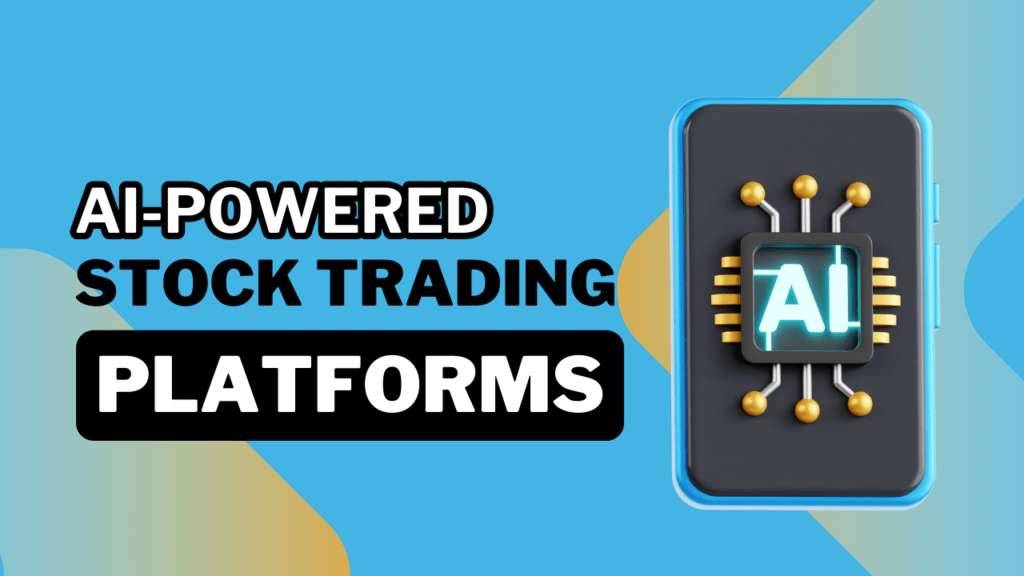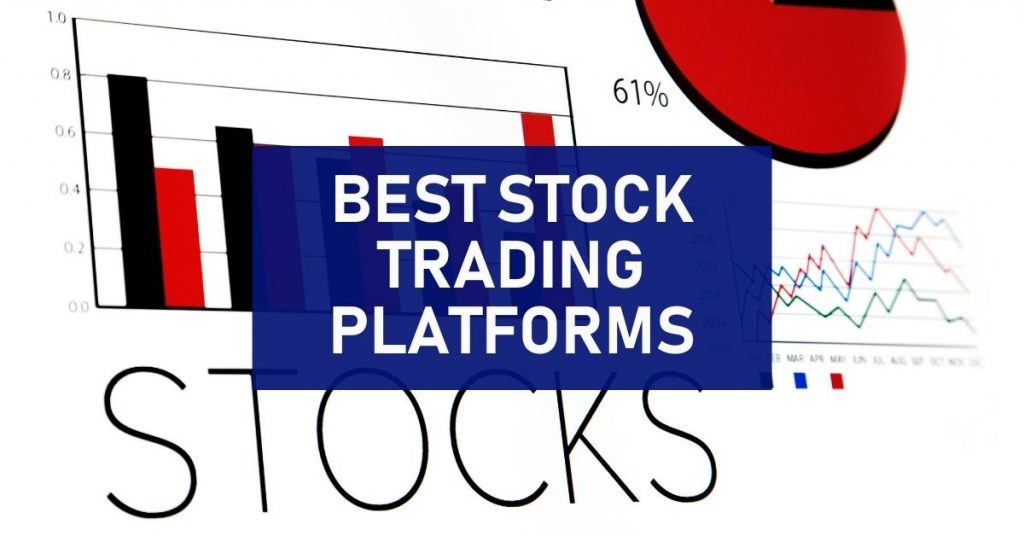Looking to elevate your investment strategies with cutting-edge technology? This comprehensive review will explore AI in stock trading, showcasing the top platforms available today. Whether you’re an experienced trader or a novice, these AI-powered solutions offer the tools and intelligence necessary for making informed trading decisions.
AI stock trading platforms utilize sophisticated algorithms and machine learning to analyze vast datasets and pinpoint trading opportunities in real time. These platforms automate trades, reduce risks, and can potentially boost profits. By processing millions of data points and adapting to market fluctuations, they provide a significant competitive advantage in the dynamic trading environment.
Join us as we explore the best AI stock trading software, examining their features, performance, and user feedback. By the end of this review, you’ll have the insights needed to select the optimal AI stock trading app that aligns with your trading goals and strategies. Embark on this journey with us and discover how AI for trading stocks can transform your trading experience.
Table of Contents:
Understanding AI-Powered Trading Platforms
Definition and Key Features
AI-powered trading platforms are advanced software systems designed to facilitate stock trading through the application of AI and machine learning technologies. These platforms incorporate various features, such as algorithmic trading, predictive analytics, automated trading, and real-time data processing. They enable traders to execute trades based on data-driven insights and patterns that AI models identify from vast datasets.
How AI Enhances Trading Efficiency
AI significantly enhances trading efficiency by automating the analysis of large volumes of data. This reduces the time required to identify trading opportunities and execute trades. AI models can process real-time market data, historical data, and other relevant information to generate accurate predictions and trading signals, thereby enabling traders to make faster and more informed decisions.
Types of AI Technologies Used in Trading
AI-powered trading platforms employ several types of AI technologies, including machine learning, deep learning, and natural language processing (NLP). Machine learning algorithms learn from historical data to predict future market movements. Deep learning, a subset of machine learning, uses neural networks to model complex patterns and relationships in data. NLP is used to analyze and interpret unstructured data from news articles, social media, and other textual sources to gauge market sentiment and inform trading strategies.
Benefits of using AI-powered trading platforms
AI-powered trading platforms offer numerous benefits, such as enhanced decision-making, reduced human error, and increased trading efficiency. By processing data in real time, these platforms provide insights that were previously unattainable. One of the standout features of these platforms is their ability to identify and trade the best deep learning stocks, giving traders a significant edge in the market.
- Enhanced Decision-Making and Predictive Analysis – AI-powered trading platforms offer enhanced decision-making capabilities through predictive analysis. These systems can identify trends and patterns in historical and real-time data, providing traders with actionable insights that improve the accuracy of their trading decisions. Predictive models help forecast price movements, market volatility, and potential trading opportunities.
- Automated Trading and Reduced Human Error – One of the significant advantages of AI in trading is automation. AI systems can execute trades automatically based on predefined criteria and algorithms, reducing the likelihood of human error. Automated trading ensures that trades are executed at optimal times, improving overall trading efficiency and profitability.
- Increased Trading Speed and Efficiency – AI-driven trading platforms operate at speeds that far exceed human capabilities. They can analyze data and execute trades within milliseconds, which is crucial in the fast-paced world of stock trading. This increased speed and efficiency enable traders to capitalize on fleeting market opportunities that would otherwise be missed.
- Access to Real-Time Market Data and Insights – AI-powered platforms provide traders with access to real-time market data and insights, which are essential for making informed trading decisions. These platforms continuously monitor market conditions, news, and other relevant factors, ensuring that traders have the most up-to-date information at their disposal.
Key Features to Look for in AI-Powered Trading Platforms
When selecting an AI stock trading platform, it’s crucial to consider features that enhance trading efficiency and decision-making. Look for platforms with advanced algorithms capable of processing vast amounts of data swiftly. Real-time data analysis is essential, enabling traders to make informed decisions based on the latest market trends. An intuitive user interface is also important, ensuring that both novice and experienced traders can navigate the platform with ease.
Automated trading capabilities stand out as a key feature. These allow trades to be executed based on pre-set parameters, reducing the risk of human error. The best AI stock trading software often includes robust predictive analytics, which can forecast market movements with high accuracy. Integration with a mobile AI stock trading app is another significant advantage, offering the flexibility to trade on the go.
Security features are paramount, ensuring that sensitive data and transactions are protected. Additionally, look for platforms that offer comprehensive customer support and educational resources. These can be invaluable for understanding how to effectively use AI for trading stocks. Finally, compatibility with various asset classes and markets can provide a more diversified trading experience. Selecting a platform with these features can greatly enhance your trading performance and confidence in using AI in stock trading.
If you’re looking for a versatile AI trading solution that covers not only stocks but also forex, commodities, and crypto, EA Studio stands out as a top choice. You can read more about why it’s the best AI trading software here.
Top AI-powered trading platforms: an overview
- Criteria for Selection – Selecting the best AI-powered trading platforms involves evaluating several critical criteria, including the sophistication of AI algorithms, user interface, ease of use, customer support, cost, and overall performance. Platforms that excel in these areas offer traders the best tools and resources for successful trading.
- Overview of Top Platforms – In 2024, several AI-powered trading platforms stand out for their exceptional performance and features. These platforms include advanced AI algorithms, user-friendly interfaces, and comprehensive customer support. The following sections provide a detailed review of the top three platforms, highlighting their features, capabilities, and user experiences.
Now let’s a have closer look at our Top 5 AI-Powered Trading Platforms for 2024 with features, pros, and cons:
1. Trade Ideas

Trade Ideas is a leading AI-powered trading platform renowned for its advanced stock scanning and trade idea generation capabilities. Its AI engine, Holly, conducts over a million simulated trades every night, optimizing trading strategies for the following day. This platform offers real-time market analysis, backtesting features, and comprehensive educational resources.
Pros:
- Advanced AI Engine (Holly): Conducts extensive simulated trades to optimize strategies.
- Real-Time Market Analysis: Provides up-to-date insights and trade opportunities.
- Educational Resources: Offers comprehensive tutorials and support for traders of all levels.
Cons:
- Cost: Subscription plans can be expensive for individual traders.
- Complexity: The abundance of features might be overwhelming for beginners.
- Limited Asset Classes: Primarily focused on equities.
2. Tickeron
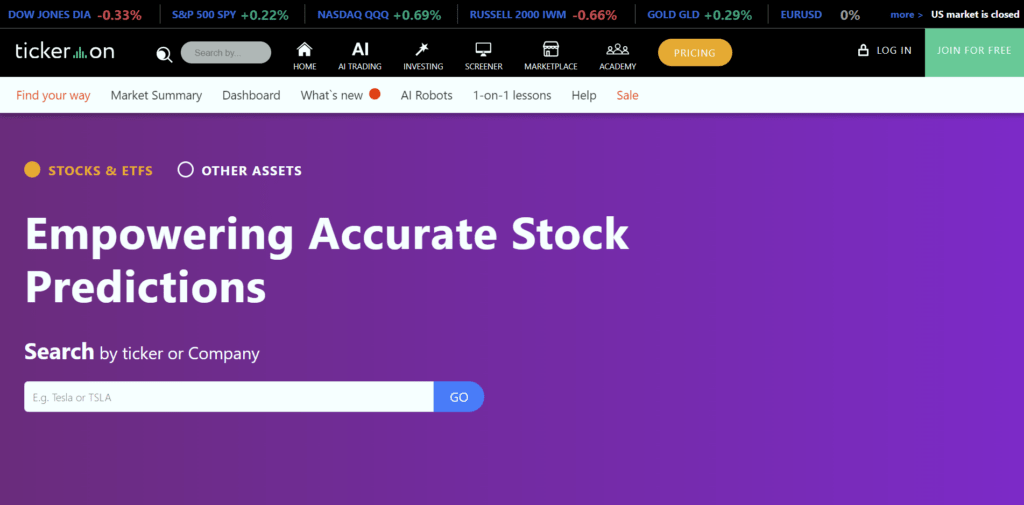
Tickeron is an AI-driven platform that provides traders with actionable insights through pattern recognition and predictive analytics. It offers a range of tools for both novice and experienced traders, including AI trend predictions, market scans, and real-time trading signals. Tickeron’s AI algorithms analyze vast amounts of data to identify profitable trading opportunities.
Pros:
- Trend Predictions: Provides actionable insights through pattern recognition.
- User-Friendly Interface: Accessible to both novice and experienced traders.
- Real-Time Trading Signals: Offers timely alerts for potential trades.
Cons:
- Subscription Fees: Advanced features require a paid subscription.
- Accuracy Variability: Predictive accuracy can vary depending on market conditions.
- Customer Support: Some users report slow response times from support.
3. Alpaca
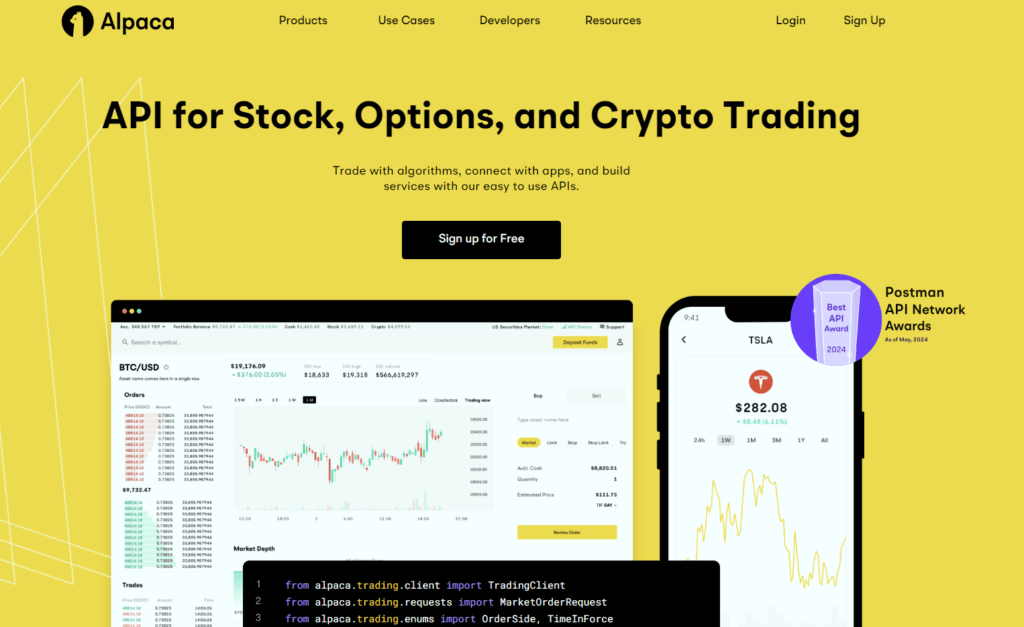
Alpaca is an AI-powered trading platform that provides commission-free trading and an open API for algorithmic trading. It offers robust data feeds, real-time market updates, and AI-driven trading signals. Alpaca is particularly popular among developers and quantitative traders who want to create and deploy their own trading algorithms.
Pros:
- Commission-Free Trading: No fees for trades, making it cost-effective.
- Open API: Ideal for developers and algo traders.
- Real-Time Market Updates: Provides current data feeds and trading signals.
Cons:
- Limited to U.S. Markets: Focuses primarily on U.S. equities.
- API Complexity: Requires programming knowledge to fully utilize features.
- Customer Support: Mixed reviews on the responsiveness and helpfulness of support.
4. Kavout
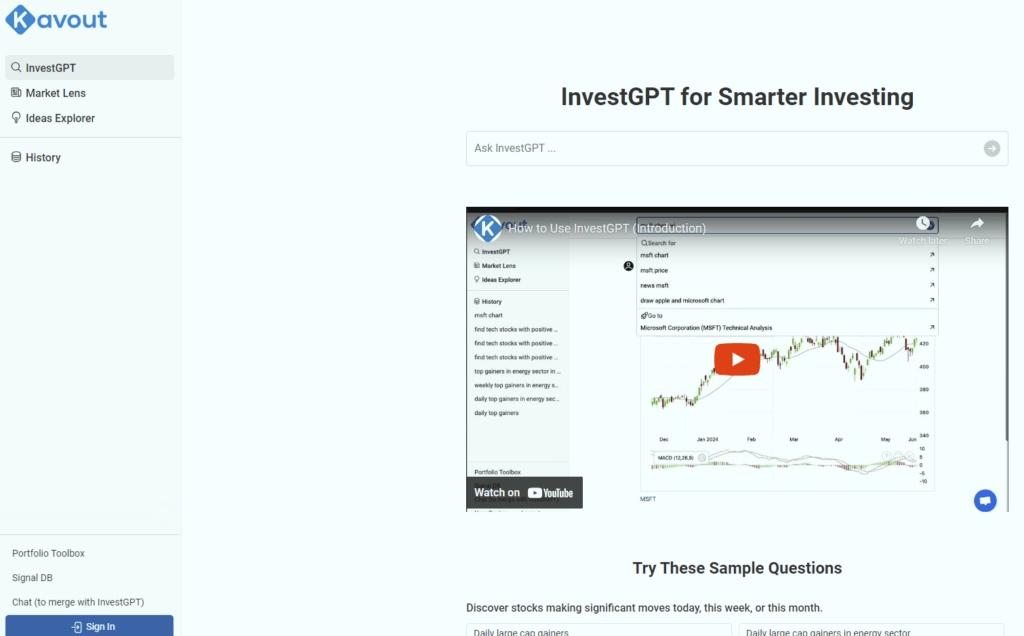
Kavout leverages AI to provide traders with predictive analytics and stock rankings through its proprietary Kai Score. The platform analyzes financial data, news, and market trends to generate accurate stock ratings and trade recommendations. Kavout’s user-friendly interface and powerful AI tools make it a valuable resource for individual and institutional traders alike.
Pros:
- Predictive Analytics: Uses AI to generate accurate stock ratings and trade recommendations.
- User-Friendly Interface: Easy to navigate and use.
- Comprehensive Data Analysis: Analyzes financial data, news, and market trends.
Cons:
- Subscription Cost: Access to advanced features requires a paid plan.
- Market Focus: Primarily focused on equities, limiting diversification.
- Data Lag: Some users report occasional delays in data updates.
5. QuantConnect
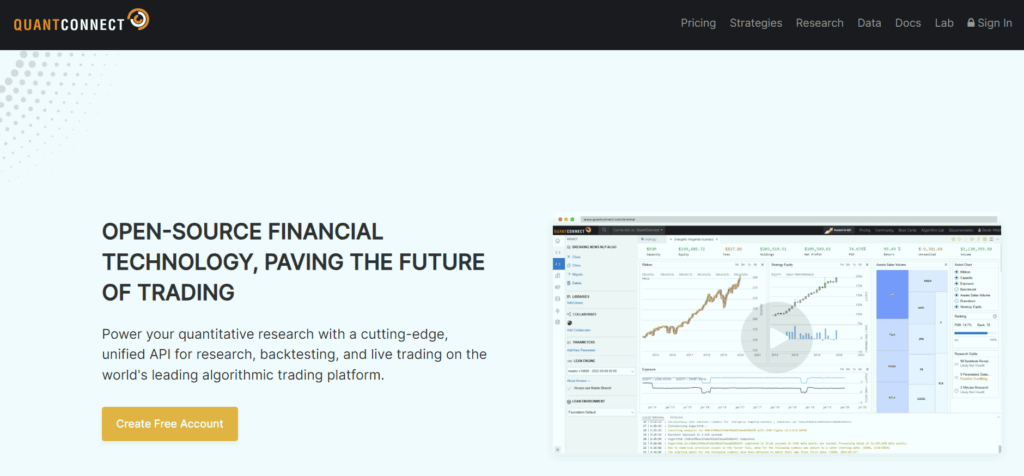
QuantConnect is an algorithmic trading platform that uses AI and machine learning to help traders develop, backtest, and deploy trading strategies. It supports multiple asset classes, including equities, forex, and cryptocurrencies. QuantConnect offers a rich data library, advanced backtesting capabilities, and a collaborative community of traders and developers.
Pros:
- Algorithmic Trading Support: Allows development, backtesting, and deployment of trading strategies.
- Multi-Asset Class Support: Supports equities, forex, and cryptocurrencies.
- Collaborative Community: Active community for sharing strategies and insights.
Cons:
- Learning Curve: Requires a strong understanding of programming and trading concepts.
- Subscription Fees: Advanced features and data access require a paid subscription.
- Technical Complexity: Can be challenging for those without a technical background.
Future Trends in AI-Powered Trading
Advancements in AI technology continue to shape the landscape of AI in stock trading, driving innovation and efficiency. Machine learning algorithms are becoming more sophisticated, allowing AI stock trading apps to provide highly accurate market predictions and automated trading strategies. As these technologies evolve, we can expect AI to handle larger datasets with greater precision, enhancing the capabilities of the best AI stock trading software. Future trends point towards the integration of natural language processing, enabling AI to analyze news and social media sentiment, further informing trading decisions.
Looking ahead, AI’s role in trading will expand beyond traditional stocks to include cryptocurrencies and other financial instruments. This evolution will make AI for trading stocks more versatile and indispensable. The impact of AI on global financial markets is profound. It promises increased market efficiency, reduced transaction costs, and the democratization of trading by making sophisticated tools accessible to individual investors.
Moreover, as AI technology advances, regulatory frameworks will adapt to ensure transparency and fairness. The AI stock trading platform of the future will not only be a tool for executing trades but also a comprehensive ecosystem for financial decision-making. Embracing these innovations will be crucial for traders aiming to stay competitive in an increasingly automated market.
Conclusion: Choosing the Best AI-Powered Trading Platform for Your Needs
In summary, our comprehensive review of the best AI-powered trading platforms revealed several key insights. These platforms harness advanced algorithms and machine learning to revolutionize AI in stock trading. They provide enhanced decision-making capabilities, automate trading processes, and offer real-time market insights. Notably, the best AI stock trading software includes features that cater to various trading strategies and experience levels.
When choosing an ai stock trading app, consider factors such as user interface, cost, and the specific AI technologies used. The platforms we reviewed offer a blend of these attributes, making them suitable for both novice and seasoned traders. They can transform your trading approach, offering a competitive edge in a fast-paced market. AI not only simplifies the stock trading process but also significantly improves the accuracy of market predictions, thereby reducing potential risks.

